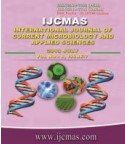


 National Academy of Agricultural Sciences (NAAS)
National Academy of Agricultural Sciences (NAAS)

|
PRINT ISSN : 2319-7692
Online ISSN : 2319-7706 Issues : 12 per year Publisher : Excellent Publishers Email : editorijcmas@gmail.com / submit@ijcmas.com Editor-in-chief: Dr.M.Prakash Index Copernicus ICV 2018: 95.39 NAAS RATING 2020: 5.38 |
Tomato (Lycopersicon esculentum L.) is the world’s largest vegetable crop after potato and sweet potato, belongs to family Solanaceae. It was universally treated as “protective food” because of its special nutritive value. Fusarium wilt of tomato is one of the most devastating diseases, caused by Fusarium oxysporum f.sp. lycopersici. It is a soil borne pathogen which causes serious loss in tomato production and attacks plants through roots at all stages of plant growth. So, the present study was been undertaken to evaluate the effects of some eco-friendly bio-agents, chemicals and essential oils against Fusarium oxysporum f.sp. lycopersici, by which we can improve the agricultural production of tomato. Out of all bioagents, Trichoderma harzianum showed maximum zone of inhibition of test pathogen followed by Trichoderma viride and Trichoderma koningii. During the evaluation of agrochemicals against the test pathogen, carbendazim showed best results followed copper oxychloride and mancozeb. As we know that the essential oils are the best alternative in place of chemicals. So, in this context, five essential oils viz., thyme oil, clove oil, eucalyptus oil, neem oil and cinnamon oil is used to manage the test pathogen of tomato wilt, in which thyme oil inhibit the growth of test pathogen completely followed by clove oil.
 |
 |
 |
 |
 |